Graham Reid | | 7 min read
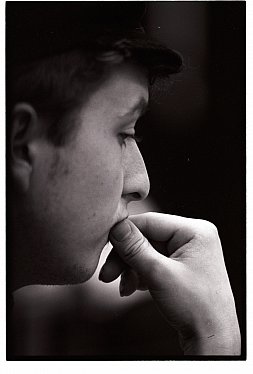
.
.
"Do you think that you've played any role in the change of popular music in the last few years?
"I hope not."
-- Bob Dylan, interviewed by Rolling Stone magazine's Jan Wenner in 1969
THE MAN
Dylan's background
1941: Born in to a middle-class Jewish family in Duluth, Minnesota. Real name Robert Zimmerman.
Family moved to Hibbing, Minnesota (another small mid-West town) when he was six.
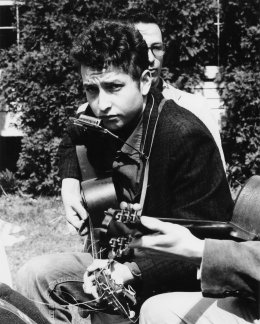 During his teenage years he heard rock'n'roll (Little Richard, Elvis, Buddy Holly) on the radio and started forming small bands
During his teenage years he heard rock'n'roll (Little Richard, Elvis, Buddy Holly) on the radio and started forming small bands
In his high school year book he said his ambition was "to join Little Richard".
It is worth noting however, as Prof Richard F Thomas did in his recent book Why Bob Dylan Matters, that in the entry it also notes he was in the Latin club. Hmmm.
1959: Went to university in Minneapolis, Minnesota and became interested in the pure, straight-ahead sound of folk music, especially that of the troubadour and political activist Woody Guthrie.
Started performing folk songs (covers) under the name Bob Dylan, taking the surname from the Welsh poet Dylan Thomas.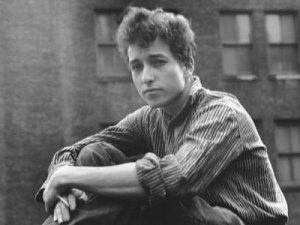
1961: Quit university and went to New York hoping to visit Woody Guthrie who was then seriously ill in hospital.
Met Guthrie and decided to pick up the dying man's tradition of honest, direct, sometimes political folk music.
Started performing in the folk clubs of Greenwich Village.
Woody Guthrie . . .
This Land is Your Land, This Land is My Land
Talking Dustbowl Blues
Dylan in New York
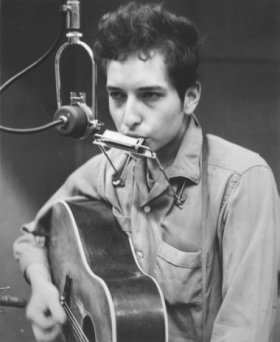
Talkin' New York
Song to Woody
THE MUSIC
"Amateurs borrow, professionals steal" -- Bob Dylan
Even before he became "Bob Dylan" and famous beyond New York City his influences were much broader than the usual folk singers playing in the coffee bars.
Many of them were singing traditional songs and the ethic was "authenticity", that is you don't mess with the tradition.
Maid of Fife-E-O by the Clancy Brothers w Tommy Makem, traditional, recorded 1961
Pretty Peggy-O, recorded 1961
Mama Let Me Lay It On You, Blind Boy Fuller, 1936?
Baby Let Me Follow You Down, 1961
See That My Grave is Kept Clean, Blind Lemon Jefferson, 1930s?
See That My Grave is Kept Clean, Bob Dylan, 1961
Also wrote some very lovely originals
Don't Think Twice, It's Alright. From the Whitmark demos, 1962?
but on his small selling debut album also went back to the blues as much as folk
House of the Risin' Sun (traditional, 1962
Right from the start Dylan drew on very diverse influences, the allusion of his adopted name suggests as much.
Dylan Thomas: A tumble of images conjuring up a picture of the Welsh town.
Under Milkwood (extract) read by Richard Burton
Jack Kerouac: On the Road
The influence of Bob Dylan in the early 60s.
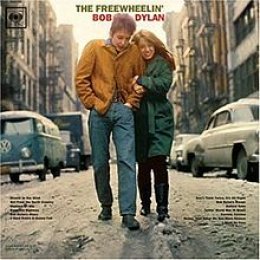 He brought a literary sensibility to pop music from his folk background. The words actually meant something . . . as in Blowing in the Wind recorded at the height of the Civil Rights movement.
He brought a literary sensibility to pop music from his folk background. The words actually meant something . . . as in Blowing in the Wind recorded at the height of the Civil Rights movement.
"How many roads must a man walk down, before you call him a man?"
Blowin' in the Wind (1963)
Dylan was strongly associated with the struggle for equality and appeared at concerts with Joan Baez and other folk singers. Considered a "protest singer" (a label he baulked at).
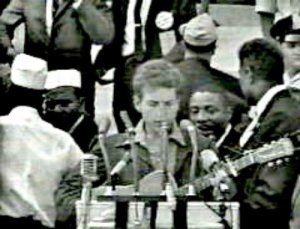 In '63 at the famous March on Washington at which MLK delivered his "I have a dream" speech Dylan performed just before King spoke.
In '63 at the famous March on Washington at which MLK delivered his "I have a dream" speech Dylan performed just before King spoke.
He also went to Mississippi for a civil right rally that year and sang Only A Pawn in Their Game, his song about the murder of the state's NAACP leader Medgar Evans.
In his catalogue also were The Ballad of Hollis Brown and The Lonesome Death of Hattie Carroll.
And this about another similar story
The Ballad of Hollis Brown, 1963
Ballad of Hollis Brown
And topical
Who Killed Davy Moore from '63
With songs like A Hard Rain's A-Gonna Fall, Masters of War and The Times They Are A-Changin' he becomes the unwitting and unwilling "spokesman for a generation".
Folk music changes from its former style (rural, recording long gone events) into "protest" (contemporary and urban).
Songwriting as reportage?
This simple song is based on Dylan reading newspaper accounts of the killing of 51-year-old black barmaid Hattie Carroll (and mother of 11 children, Dylan says 10) by William Devereux Zantzinger (whom the song calls "William Zanzinger"), a wealthy young white tobacco farmer in Charles County, Maryland and his subsequent sentence to six months in a county jail.
Songwriting as judgement too. (race, wealth, privilege)
The killing took place in February '63 and the final sentence was handed down in August (on the same day as Martin Luther King made his famous "I have a dream . . ." speech). Dylan's song was recorded in October and appeared on an album in January of the following year.
Listen to Dylan's repetition of the "table" in the case of victim Hattie Carroll (the high table of privilege; and she "never done nothin' " the ungrammatical phrase coming from the unprivileged and inarticulate working class)
The Lonesome Death of Hattie Carroll, Bob Dylan, 1963
Dylan had previously written The Death of Emmett Till about the killing of a young black boy from Chicago in 1955 who allegedly flirted with a white woman while he was down in Mississippi. You can read the story here, but basically Dylan tells it to you. This is the young and open Dylan, but after he became famous -- just three years later -- he retreated from the world/explanation etc
The Death of Emmett Till, Bob Dylan, radio show 1962
In other songs he was less explicit, adopting a poetic style of rolling images to evoke . . . what?
This one has been interpreted as everything from an impending apocalypse to race conflict to nuclear war
A Hard Rain's A-Gonna Fall (1963)
But this one made him into a prophet for his era for many people, and he became (the reluctant) "spokesman for a generation".
The Times They Are A-Changin'
.
THE SELF-MYTHOLOGISING
Lyrics from Long Time Gone, 1962: "My parents raised me tenderly, I was their only son. My mind got mixed with ramblin' when I was all so young. I left home my home the first time when I was twelve and one . . ."
(And this original bears more than a passing resemblance to a traditional folk song Maggie Walker's Blues (which Dylan knew). It opens "My parents raised me tenderly, they had no child but me. My mind got mixed with rambin' . . .")
Passage from a written piece My LIfe in a Stolen Moment (which mixed fact with considerable fiction), from '62: " . . .Hibbing's a good ol' town. I ran away from it when I was 10, 12, 13, 15, 15 and a half, 17 an' 18. I been caught an' brought back all but once . . . "
and more . . .
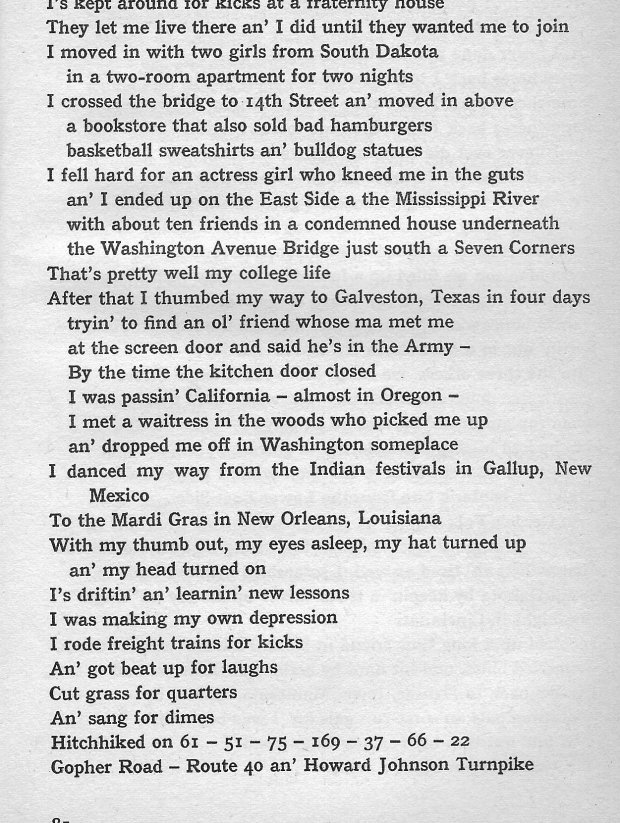
And on his second album The Freewheelin' Bob Dylan (released May '63 and which included Blowin' in the Wind, Masters of War, Hard Rain and I Shall Be Free) he included songs entitled Bob Dylan's Blues and Bob Dylan's Dream as well as Don't Think Twice It's Alright . . .
And Down the Highway ("I'm walking down the highway with my suitcase in my hand . . .")
He set himself apart from other folk singers and was a freewheelin' ramblin' guy . . .
Bob Dylan's Blues
Don't Think Twice
Bob Dylan's Dream
He was creating the myth that he wasn't one to be tied down, just a man on the road like Woody, Jack Kerouac (who wrote On the Road) . . .
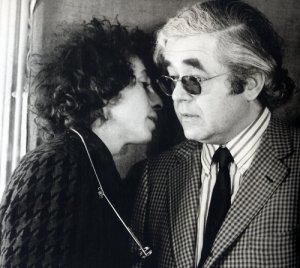
THE MARKETING
Dylan was ambitious and very interested in making money.
He found his champion in Albert Grossman (right) who was a Chicago-born son of Russian-Jewish immigrants. He had a degree in economics but liked to hang around the folk clubs and was known as a shrewd hustler.
Grossman was hired by concert promoter George Wein to produce the 1959 Newport folk festival and he had an immediate rapport with the musicians.
Grossman liked them and respected them as artists -- he'd smoke joints with them when others would be stand-offish -- and he was confrontationally aggressive on the part of those he managed like Peter, Paul and Mary a popular folk trio that he actually created by bringing the individual musicians together.
He negotiiated much higher fees for his artists than any other manager but he also left them alone to take care of the music.
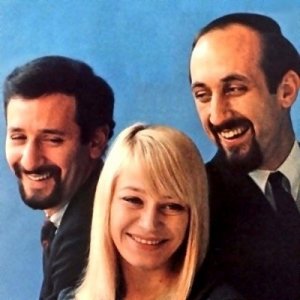 "He was very intuitive," said Peter Yarrow (of PP&M). "Very gutsy, very street. He was also brillant . . .he immediately established his dominace in our relationship . . . there was an edge to Albert which put me in awe of him. Not because of his brilliance, but because of the magnetism and the energy and the aggressiveness of his persona".
"He was very intuitive," said Peter Yarrow (of PP&M). "Very gutsy, very street. He was also brillant . . .he immediately established his dominace in our relationship . . . there was an edge to Albert which put me in awe of him. Not because of his brilliance, but because of the magnetism and the energy and the aggressiveness of his persona".
Grossman negotiated Dylan out of a publishing contract and so would prove particularly appealing to "Bob Dylan who harboured ambitions that were at odds with the puritannical ethos of many in the folk movements". -- Fred Goodman in The Mansion on the Hill.
Goodman again . . .
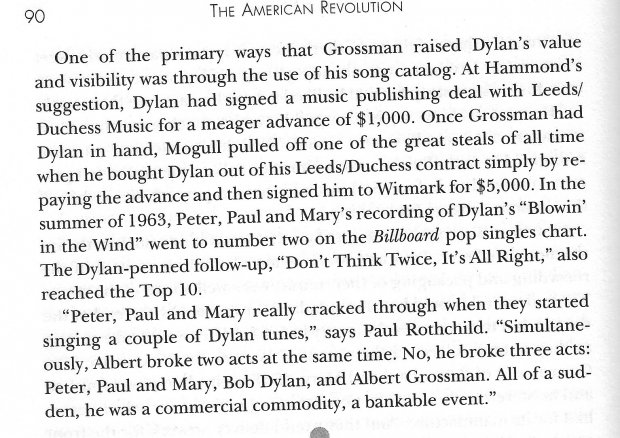
Peter Paul and Mary, Blowin in the Wind
Peter Paul and Mary, Don't Think Twice It's Alright
Joan Baez, Blowin in the Wind
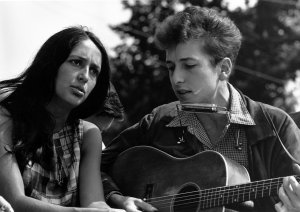 Many found Grossman very hard to read -- he would mumble, not talk, wait people out in negotations, wear them down -- and yet he not only managed Dylan, Peter Paul and Mary but also Janis Joplin (whom he adored) and many other acts on the bridge between folk and rock and blues.
Many found Grossman very hard to read -- he would mumble, not talk, wait people out in negotations, wear them down -- and yet he not only managed Dylan, Peter Paul and Mary but also Janis Joplin (whom he adored) and many other acts on the bridge between folk and rock and blues.
Dylan's partner/companion/fellow traveller Joan Baez didn't sign with Grossman, she didn't trust him.
Goodman notes that both Grossman and Dylan were indecipherable to outsiders (a mystique grew around Dylan because he spoke in riddles and couldn't be pinned down).
Increasingly as his fame grew Dylan didn't want to deal with anyone and withdrew and Grossman protected him . . . and so the mystique grew even more.
And soon enough the times -- and Dylan -- were a-changin'.
Why Try To Change Me Now, from Shadows in the Night (2015), written 1959
.
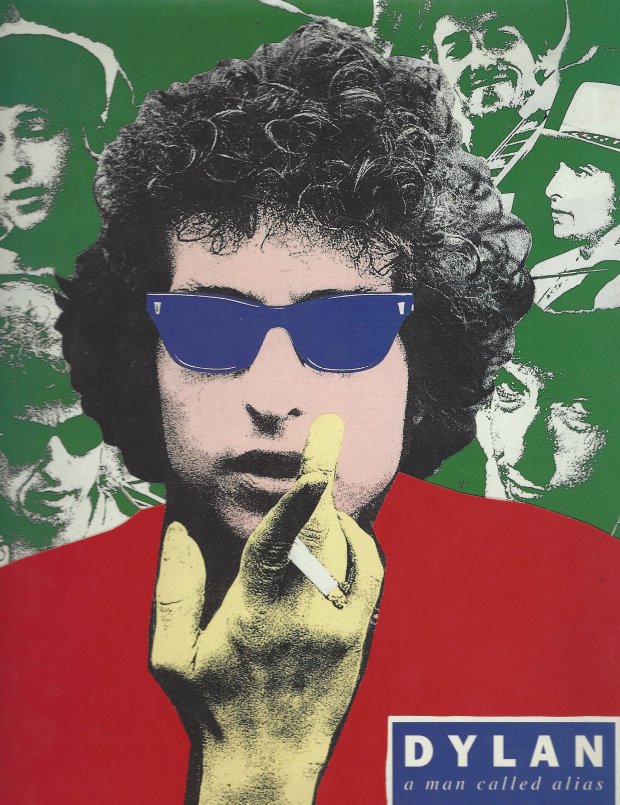


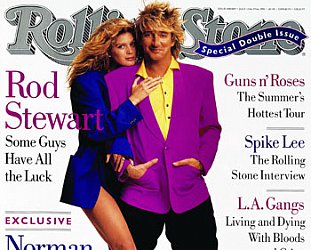
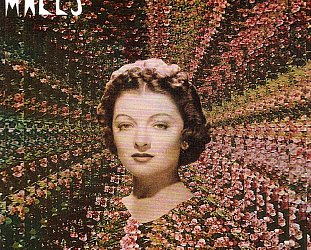
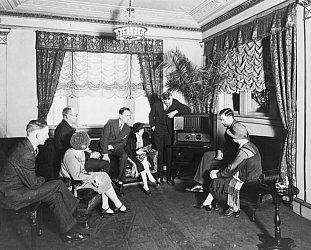
post a comment